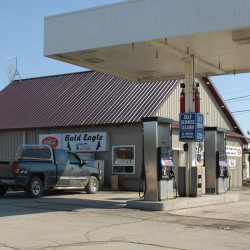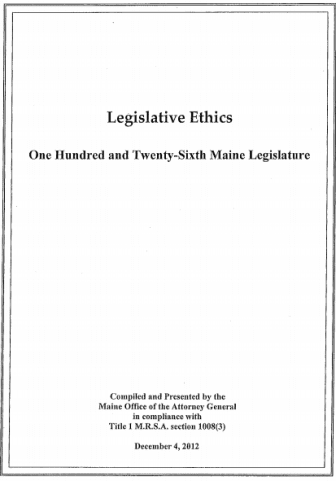An Irving family company agreed to reduce by $150,000 the debt a leading Democratic legislator owed to the company – the same legislator who has been pushing to loosen state environmental regulations so that another Irving company can mine Bald Mountain in northern Maine.
Irving Oil, according to a bankruptcy filing, said state Rep. John Martin, D-Eagle Lake, owed the company $250,000 for gasoline and diesel deliveries and other charges to a convenience store he co-owned under the corporate name Eagle Lake Outfitters in his home town.
The debt was first revealed in a 2012 news story by the Maine Center for Public Interest Reporting (MCPIR) about Martin and a partner filing for bankruptcy protection for their store. But the resolution of the bankruptcy and official reduction of the debt, which the court approved in March, 2014, has not previously been reported.
Federal bankruptcy court papers show that Irving Oil itself made a legal motion that resulted in the company receiving only 40 percent — a little over $100,000 — of the amount it claimed was owed by Martin and his business partner.
Martin, 73, the former longtime House speaker, is on the Environment and Natural Resources Committee, where throughout this year’s legislative session and a previous session he has promoted changes to the mining laws to allow J.D. Irving to excavate an open-pit copper and zinc mine in his district, which includes Fort Kent. In 2012, Martin introduced the first bill to make it easier to mine for valuable minerals on Bald Mountain.

Martin refused to provide information on the bankruptcy when, outside the environment committee hearing room in the State House complex, he was asked for details on the transactions by a MCPIR reporter.
“It’s none of your business,” he replied. “I don’t give a shit what you want. You work for a lousy outfit of people, and I have no intent of talking to you or them. Is that clear?”
Irving’s proposed mine has been vigorously opposed by environmental and conservation groups – from the Natural Resources Council of Maine (NRCM) to Trout Unlimited – as well as some Aroostook County residents. Last Friday, the environment committee voted to pass the mining legislation, with Martin and fellow Democrat Rep. Robert S. Duchesne, of Hudson, joining the six committee Republicans to pass the bill. The remaining four committee Democrats and one Independent, Portland Rep. Ben Chipman, voted against the bill.
Martin has said there was no conflict of interest between what his store owed Irving Oil and his promotion of J.D. Irving’s interests because the two Canadian conglomerates are legally separate — a point also stressed by a spokesperson for J.D. Irving.
‘They do cooperate’
Two octogenarian Irving brothers each control the distinct business empires and in recent years the media have chronicled how their personal and business relationships have cooled. But an expert on the Irving companies said that their two corporate entities – famous for being secretive – also work together.
“Yes, they do cooperate still,” said Jacques Poitras, a Fredericton, New Brunswick-based Canadian Broadcasting Corporation correspondent and author of the 2014 book, “Irving vs. Irving.” Poitras cited how J.D. Irving railways “have hauled the oil-tanker cars from Alberta on the final leg of their trip to the Irving Oil refinery” in Saint John, New Brunswick. “I describe this particular arrangement in the last chapter of the book in describing the impact of the Lac-Megantic explosion on both branches of the Irving family.”
Poitras was referring to the 2013 deadly derailment in Lac-Megantic, Quebec – five miles from the Maine border – of a Montreal, Maine & Atlantic Railway train on its way to the refinery. Part of the downtown was incinerated, killing 47 people.
Irving Oil was Eagle Lake Outfitters’s largest creditor. Headquartered in Saint John, the oil company is the central unit of a set of corporations owned by billionaire Arthur L. Irving.
His brother, another billionaire, James (J.K.) Irving, owns J.D. Irving. Also based in Saint John, it’s the largest of many companies overseen by James D. (Jim) Irving, J. K’s son. Vast timberlands in New Brunswick and Maine constitute the core of their businesses. Bald Mountain is contained within J.D. Irving’s 1.25-million Maine acres. J.D. Irving is the largest landowner in Maine.
Environmentalists fear water pollution from the proposed mine could ruin the relatively unspoiled character of a big part of the North Woods. Besides valuable metals, the mountain has significant amounts of arsenic and sulfide minerals that could contaminate the water table.
Opponents also fear that changes being considered to the mining law would allow other areas in Maine to be mined, including public lands used for recreation.
The NRCM says that mines throughout the world – including two dug in Hancock County in the mid-twentieth century – have a sorry record of pollution, often leaving the public on the hook for immense cleanup sums.
But J.D. Irving and its supporters argue that contemporary technology can create a non-polluting mine and that a poor part of the state would benefit from the 300 jobs the company says would be created, plus 400 indirect jobs due to increased economic activity in the area. Martin has said that he supports the Bald Mountain development because it would bring jobs to Aroostook.
Republican Gov. Paul LePage and his Department of Environmental Protection, business groups and many Republican legislators strongly support Irving’s mining proposal.
Blocking the changes to the mining rules may rest with Democrats, who control the House and tend to be skeptical about mining. But Martin – who was once considered virtually all-powerful as speaker – might be able to bring some of his party along on the crucial votes.
However, “I don’t think he has as much sway as he had,” said state Rep. Benjamin Chipman, the Portland independent.
Chipman, who sits next to Martin in the Environment and Natural Resources Committee room, also observed, in regard to Martin’s potential conflict of interest involving the Irving companies: “He doesn’t see it as that. But other people see it that way.”

The bankruptcy papers show that Eagle Lake Outfitters’ creditors other than Irving were owed a total of $45,000. Martin’s partner, Gary Voisine, wouldn’t get into details on the bankruptcy, but he said all the creditors had been settled with.
A representative of Tulsa Inc., a gas station and “petroleum services” firm in Van Buren, which was owed $21,000, the largest amount after Irving Oil, said it had been paid. A spokesperson for the state Inland Fisheries and Wildlife Department said it had been paid the $2,200 it was owed for license fees. Several other creditors did not return phone calls.
In the bankruptcy settlement, Martin and his partner paid $125,000. Of that, $101,343.43 went to Irving and the balance went to court fees and other creditors.
In 2012, Martin told the Maine Center that he and his partner bought back the store for $125,000 they got from “private business equity,” but would not elaborate.
Voisine, who owns Bald Eagle 50-50 with Martin, said “how I pay off stuff” was not the press’s business.
He angrily denied any “deal” with the Irving companies. He said “we never owed” $250,000 to Irving Oil, but only $100,000. The company had jacked up the amount owed with “lawyer fees for years” and “a bunch of” other charges, he claimed.
A spokesman for Irving Oil responded, “It’s on the public record that a judgment was granted by a Maine Court in Irving Oil’s favor against Eagle Lake Outfitters for amounts the Court agreed were owed to our Company.” He added that Irving Oil and J.D. Irving are “two separate companies, operated completely independently.”
Martin’s bankruptcy and involvement with the Irving companies were reported during his 2012 campaign for reelection to the House. Following that revelation, he was defeated by a political newcomer. He retook the seat in 2014. In the 1990s a ballot-stuffing scandal sent a Martin aide to jail that cost the veteran legislator the speakership.
The ethics rules
Maine’s ethics laws for legislators do not specifically mention bankruptcy debt, nor do they require disclosure of any debt to a creditor incurred by a legislator-owned business. Jonathan Wayne, director of the state’s Commission on Governmental Ethics and Elections Practices, would not comment on the situation with Martin and Irving. When asked whether any sections of the state’s ethics laws could apply to the bankruptcy of a legislator’s business, Wayne said there are two sections that address whether a member of the Legislature is using their public position to benefit themselves or another entity could apply.

The first one states that it is a violation of legislative ethics when “a Legislator or a member of the Legislator’s immediate family accepts gifts, other than campaign contributions duly recorded as required by law, from persons affected by legislation or who have an interest in an entity affected by proposed legislation and the Legislator knows or reasonably should know that the purpose of the donor in making the gift is to influence the Legislator … or is intended as a reward for action on the Legislator’s part.”
The second section that could apply states that it is a violation of legislative ethics for a legislator to engage in conduct that constitutes an abuse of office or position. That includes “granting or obtaining special privilege, exemption or preferential treatment to or for oneself or another, which privilege, exemption or treatment is not readily available to members of the general community or class to which the beneficiary belongs.”
The current House speaker, Democrat Mark Eves, declined to comment on the possible conflict of interest between the $150,000 reduction of Irving Oil’s claim and Martin’s legislative duty to promote the public interest.
Eves did, however, sound like a mining opponent in a statement: “I have very strong reservations about mining in our state. . . . I worry about the harm these mining rules could bring to our water, land and air, plus the cost taxpayers could face for cleaning up pollution in the future.”
Legislators are generally loath to publicly criticize each other. Rep. Ralph Chapman, D-Brooksville, who has led the charge against relaxing the mining-law environmental protections, wouldn’t comment when asked about Martin’s possible conflict of interest. But, he observed, “The opportunity for corruption is something the Legislature needs to be sensitive to.”




